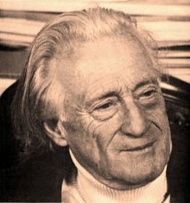Henri Lefebvre
From Geography
Henri Lefebvre (1901-1991) was a French philosopher, sociologist and intellectual who was born Hagetmau, which is situated in a peripheral area in France. He was generally considered to be a neo-Marxist. Lefebvre studied philosophy at the University of Paris (Sorbonne) and graduated in 1920. In 1928 Lefebvre joined the French Communist Party (PCF). Between 1930 and 1940 he worked as a professor of philosophy, after which he joined the French Resistance in 1940.
Contents |
Lefebvres work
In 1947 Lefebvre published his work 'Critique of Everyday Life', which was one of the major inspirations for the founding of the COBRA movement.
Another important work of Henri Lefebvre, especially for the discipline of Human Geography, was his 'La production de l’espace (1974)' , which was translated into 'The Production of Space' seventeen years later. Lefebvre’s main argument in this book is that space is a complex social construction (or product) which influences spatial actions and perceptions (Sunderland, 2009). He argues that space is not a pre-existing, neutral given, but more an ongoing production of spatial relations. By saying this, Lefebvre situates himself in post-structuralist or post-modern discourse (Canete, 2004). In that sense, Lefebvre introduced the concept of ‘social space’. According to Lefebvre, this social space is both physical as well as conceptual. Within this social space the cultural life of society takes place. It’s formed and produced by patterns of social interaction. But it’s also the other way around, i.e. the social space also produces and shapes these social patterns, it shapes society (Sunderland, 2009).
In order to explain how space is produced, Lefebvre developed the so called 'Spatial Triad'. This Spatial Triad consists of three different types of space, namely: 'spatial practice', 'representations of space' and 'representational spaces'. The spatial practice, also reffered to as Firstspace or perceived space, can be seen as the physical space around us. In this Firstspace, spatial relations between objects and products are produced and reproduced. It is the medium and outcome of human activity, behaviour and experience (Soja, 1996, p. 66)The representations of space, also reffered to as Second space or conceived space, could be seen as a conceptual and objective type of space. The second space is the primary space of utopian thoughts and vision, of creative imagination (Soja, 1996). Representational spaces, also called Thirdspace or Lived space, refer to the space we actually live in. In this Lived space social relations take place. Representational spaces consist of the lived experiences that emerge as a result of the relation between first space (spatial practice) and second space (representations of space). According to Lefebvre, it's the interaction of these three processes over time that produces space, or reality (Canete, 2004). Lefebvre states that politics happen in the gap between the spatial practices (firstspace/objective space) and the representations of space (secondspace/ subjective space). The third, lived space thus is the working out of the first two spaces.
Everyday life
Lefebvre was an important theorist for understanding the spaces and places of everyday life. He insists that everyday life is related to all activities as their common ground or bond even though it may be seen as a space 'what is left over' after all stuctured activities have been analysed and taken out. Lefebvre sees the everyday both as restricting and enabling by seeing the everyday as a space for more authentic living and for radical change and the production of other, differential spaces, as a counterreality tot the clock/factory/industrial modernity (O. Kramsch, hoorcollege Lefebvre, Nimegen, 2 oktober 2012). On the other hand he argues that it has been colonized by the commodity and the state by imposing it as an abstract space (Gregory, Johnston, Pratt, Watts, Whatmore, 2009).
References
Canete, A. (2004). The Production of Space by H. Lefebvre. Arizona State University, Arizona.
Gregory, D., Johnston, R., Pratt, G., Watts, M.J. & Whatmore, S. (2009) The dictionary of human geography. Chichester: Wiley-Blackwell
Soja, E. (1996) The Trialectics of Spatiality. In Thirdspace: Journeys to Los Angelos and other real-and-imagined places. (p. 53-82) Oxford: Blackwell.
Sunderland, M.J. (2009). Henri Lefebvre and The Production of Space. Society, 17, 18-19.
Contributions
Published by Marijn Termorshuizen & Gert Gerritsen
Edited by Malou van Woerkum, 23-10-2012
Edited by --AnneStrien 09:14, 24 October 2012 (CEST)
Edited by Lars-Olof Haverkort --LarsHaverkort 14:30, 24 October 2012 (CEST)
Picture added by Doris Roelvink, 25 october 2012
